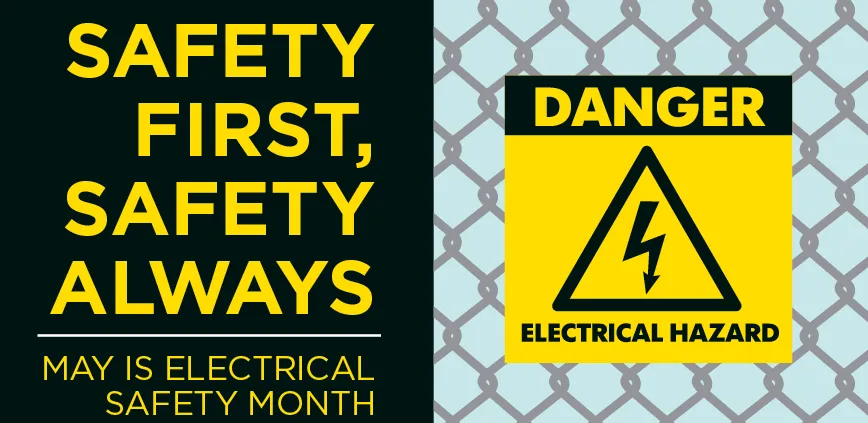Electrical Safety: Aware and Prepared
The month of May is recognized as Electrical Safety Month; and, although electricity is a power that should always be understood and respected, it is often taken for granted, leaving countless victims in its wake.
Did you know that electrical hazards cause more than 300 deaths and 4,000 injuries each year among the U.S. workforce?
Electrocution ranks sixth among causes of workplace fatalities in America. Nearly half of the approximately 175 deaths caused each year in the electrical trades occur in construction, according to the Bureau of Labor Statistics. Electricity is the cause of more than 140,000 fires each year; and, contributes to approximately $1.6 billion in property damages.
OSHA confirms that construction workers are most commonly killed by falls, blows or crushing from heavy objects, and electrocutions. So, how do we protect ourselves from this danger? We can start by pre-planning, inspecting and eliminating potential hazards.
Here are some safety tips:
Indoors:
- Check electrical cords for fraying or cracking. Replace cords that may be damaged, and don’t overload electrical outlets.
- Remember extension cords are intended to be temporary; they are not intended as permanent household wiring.
- Don’t run cords under carpets or rugs and don’t tack or nail cords to walls or floors.
- Keep electrical appliances and tools away from water. Never reach for or unplug an appliance that has fallen into water; instead, turn the power off at the breaker before you unplug the appliance or remove it from the water.
- Never put anything other than an electrical plug in an outlet. Use outlet covers or caps to protect children.
- Keep your home’s electrical system in good repair. Contact a licensed electrical contractor if you have flickering lights, sparks, non-functioning outlets, or need wiring repairs or upgrades.
- Use Ground Fault Circuit Interrupter (GFCI) protected outlets whenever possible.
Outdoors:
- NEVER touch downed power lines!
- Always call your local utility, or, 911, if you observe any power lines down.
- Watch for overhead lines every time you use a ladder, work on roofs, trees, or when maneuvering elevated loads. When enjoying time at home or away from the workplace, be sure to keep kites, model airplanes, and metallic balloons away from power lines.
- Know what’s below before you dig. At least 2 days before starting any digging or excavating project, contact 811, the National One-Call Center, to have underground utility lines, pipes, and cables marked for free.
- Avoid planting trees underneath power lines or near utility equipment.
Remember, any electrical device used on a house wiring circuit can, under certain conditions, transmit a fatal current. While any amount of current over 10 milliamps (0.01 amp) can produce painful to severe shock, currents between 100 and 200 mA (0.1 to 0.2 amp) are lethal.
ALWAYS make sure you have plan when working around electricity.
Let’s avoid workplace complacency this month by making sure that safety is top of mind while performing any electrical task! Electrical safety concerns can often be avoided and with the help of a On-Site Safety Consultant, you can be sure that electrical safety won’t be a problem. If you have any questions feel free Ask HB NEXT.





Leave a Reply
Want to join the discussion?Feel free to contribute!